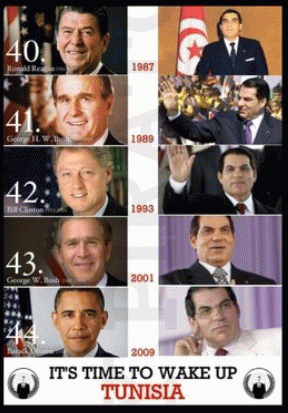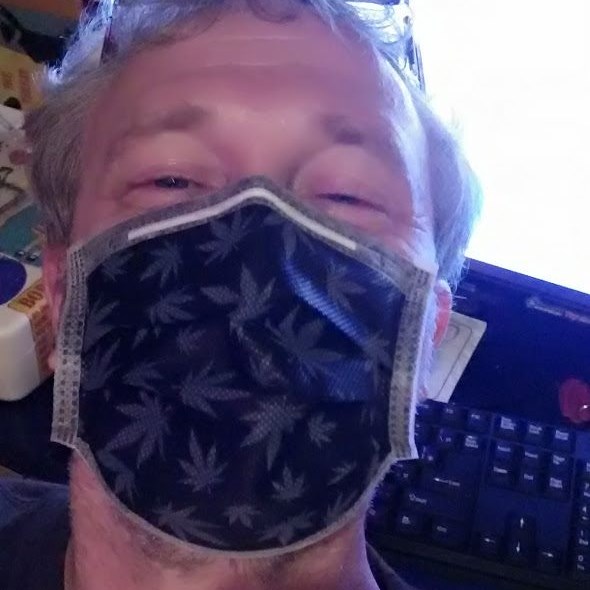Why has the world hardly noticed the first war to be broadcast live on Facebook?

Tunisian Riots: English information Facebook page graphic
(Image by Tunisian Riots: English information) Details DMCA
(JANUARY 14, 2011) Most Westerners have probably not heard a thing about Tunisia on their evening TV news this week, yet over 70 civilians have been shot dead by their own police forces in this small North African country that is home to 10 million people, most of them under the age of 30. They hunger for change, having grown up in a stifled society only recently made aware of the rights and freedoms we take for granted. For their efforts, now openly being called revolution on the streets, some are being felled by precise bullets to the head. News agencies do not operate here, so they are left with only the Internet to tell their story.
While many observers like to call Tunisia an economic miracle, this is mostly due to the fact Tunisia has been one of the most stable countries in the Arabic world for the past three decades. This stability has primarily come by the hand of a rather authoritarian leader, to put it politely. Zine El Abidine Ben Ali has ruled the country as President since 1987 and has repressed nearly all dissidence with stunning efficiency. He has without exception jailed oppositionists and outlawed anything that might look extremist to outside eyes, even beards on Muslim men.
In 2002, apparently feeling his lengthy tenure was not nearly enough, Ben Ali secured for himself the position of "President for Life", and obtained a special legislative protection against any possible future criminal proceedings. This was achieved through a special referendum in which 97% of the population supposedly agreed to his megalomaniacal wishes.
You could have called it "dictator-lite" -- up until December 24, 2010, that is, when the Tunisian police began shooting ordinary citizens dead in broad daylight. As of yesterday, January 13, the death toll stood at over 70 people, including a 15-year-old boy, a young mother of two and a deaf man who didn't respond to police warnings.
Strangely, the world has largely been unaware of these events. The little that has been reported on by journalists has referred to "protests" or, sometimes, "riots" about food prices and unemployment. There is truth in such statements, but the whole story is much more complex and bloodier. The hard news on BBC, and even al Jazeera, has definitely been way too soft.
The troubles started as a reaction to what Tunisians viewed as police culpability in the dramatic and very tragic suicide of 26-year - old Mohammed Bouazizi. He was very much a typical Tunisian youth, an educated graduate who was underemployed and selling vegetables in the local market in SidiBouzid to make ends meet. On December 17 , the local police confiscated Bouazizi's stocks, claiming he did not have a proper permit. In a frustrated response, the distraught vendor doused himself in gasoline and set himself alight in the street. It wasn't just a fire though; it was a spark .
While Bouazizi languished in hospital with third degree burns over his entire body, co-residents of the central Tunisian town of SidiBouzid took to the streets in support of the young man and also to protest what they saw as police obstructionism and government corruption, which has made the so-called Tunisian economic miracle somewhat less than miraculous for the average Tunisian, who is likely unemployed or employed and trying to support a family on an average salary of 300 USD per month in a country where the cost of food is comparable to Europe.
The protests in the town of SidiBouzid and the subsequent death of Mohammed Bouazzi garnered the attention and empathy of other Tunisians, magnifying the widespread frustrations that had been simmering in Tunisia for decades.
Unemployment has long been Tunisia's bitter pill, but it is one that has been made exceedingly bitter by the infusion of hopes created by higher education, something the autocratic government supported. More than 80,000 Tunisians graduate each year , but most typically, a degree in science , engineering or the arts gets applied to nothing more complex than serving drinks to foreign holidaymakers (if the young graduate is particularly lucky), or carving out a living any way they can for the less fortunate.
Tunisian activists have also rallied around what they see as endemic corruption. This has been recognized as a serious issue internationally -- Tunisia scores 59th best out of 178 countries on the 2010 Transparency International Index -- Tunisians themselves expect better and lay the blame squarely at the doorstep of the President's office. The extensive assets of the dominant Ben Ali and Trebelsi families are well known to Tunisians. These include such items as Nouvel Air, one of Tunisia's international airlines. A recent joke circulating on the internet lists the families' assets as a moving sale advertisement.
In addition to food prices, unemployment and corruption, Tunisians have united in opposition over the issues of freedom of expression and access to information. It has been widely accepted for years that the state-run media is not free. The new generation has largely ignored Tunisian television, which streams only tightly controlled information. Instead, they have flocked to their computers and accessed the rest of the world via the Internet. In recent years, however, the Ben Ali government has increasingly begun monitoring and censoring Internet activity, including attacks on some of the most beloved sites of Tunisian youth including YouTube, and social networking sites, such as Facebook. The censorship also extended to most foreign content.
In response, many Tunisian citizens have become devout Internet freedom activists. Nhar 3la 3ammar , for example, is a Facebook page devoted to the end of internet censorship in Tunisia with more than 29,000 followers. Loosely translated, Nhar 3la 3ammar means "About Ammar , " which refers to the Internet censor that Tunisian activists have nicknamed Ammar. This homegrown online activism turned out to be an instrumental factor that led to the blood and palpable spirit of revolution seen on Tunisian streets today, right now, as you are reading these words.
While the December street protests in support of the Mohammed Bouazizi gathered momentum, Tunisian cyber activists took to their computers to support their compatriots and document the events, effectively creating a competing and superior news source that reached thousands of Tunisians instantaneously via sites like Twitter and Facebook Mobile.
In the final days of December, the protests garnered more and more popular support on a daily basis, with solidarity protests breaking out almost constantly in all parts of Tunisia. As the number of protesters has swelled, the government's reaction has become increasingly severe, increasingly violent, and, now, increasingly deadly. The first protestor killed by police, 18-year-old Mohamed Ammari, died on December 24th. Along with Ammari, 44-year-old ChawkiBelhoussine El Hadri was shot by police and died a few days later.
(Note: You can view every article as one long page if you sign up as an Advocate Member, or higher).





